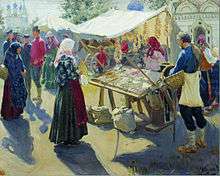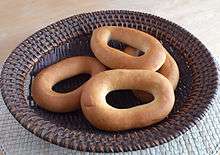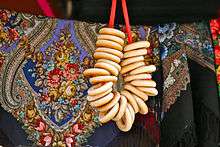Bublik
|
Bublik topped with poppy seeds | |
| Type | Bread |
|---|---|
| Region or state | Central and Eastern Europe |
| Associated national cuisine | Belarus, Lithuania, Poland, Russia, Ukraine |
| Main ingredients | Flour, milk, sugar, butter, salt, egg whites |
|
| |
Bublik (also booblik or bublyk; plural bubliki; Belarusian: абаранак, abaranak, Russian and Ukrainian: бублик, Polish: obwarzanek, Lithuanian: riestainis) is a traditional Central and Eastern European bread roll. It is very similar to a bagel, but somewhat bigger and has a wider hole. Bubliks often also have a much denser and 'chewier' texture than bagels. The bublik is acknowledged to be the progenitor of the bagel.
Bubliks are members of a class of bread products made from dough that has been boiled before baking, which also includes bagels, baranki, sushki, and other similar breads. In Russian and Ukrainian, bublik is often used as a generic designation for any ring-shaped product of this class.
History
Widely believed that making bubliks first started in Smorgon (the former Grand Duchy of Lithuania, now in Belarus). The beigl (or bagel) spread through Poland across all areas with significant Jewish population, soon reaching Ukraine (Southern Russia at the time),[1] where it was influenced by similar products and where it got its current form. These products are Russian baranki, Greek koulouri (κουλούρι)[2] or Turkish simit. They form a dough ring about twice as big as a common bagel, usually with a denser and drier texture. Its name was also heavily russified to the current form —bublik.
Preparation

Bubliks are made from yeast-leavened wheat dough that commonly contains milk, butter, and egg whites and is rather sweet. Poppy seeds are a popular addition to the dough, as well as several other fillings. For savory bubliks, sugar is omitted and instead grated cheese and a few drops of onion juice can be added.[3] Bubliks are featured by professional bakers in their shops and at country fairs and regional markets. They are usually strung on a string by the dozen.[3]
In Russia and Ukraine bubliks are usually treated not like bread, but like a type of pastry, eaten as a complement to tea or coffee.[3] Therefore, bublik dough is generally sweeter and denser than that of bagel dough, and they are usually glazed with egg yolk. By far the most popular variety of bublik has a liberal amount of poppy seeds added to it.
Consumption
Bubliks are usually eaten as is, but it is not uncommon to dip them into a beverage, a practice that came from eating sushki and baranki, which were very similar in taste, but rather dry and hard and not easily palatable unless moisturized. Another common way of eating bubliks is to break them into several fragments and to eat them with jam (varenye), sour cream (smetana), or other similar dips. While they often accompany tea, bubliks, again unlike modern bagels, are rarely considered a breakfast food.
Varieties and similar bread products


There are number of similar bread products in Russian cuisine, and the main one of this type is baranka (pl. baranki), a dough ring somewhat smaller than a bublik, but much thinner and drier. While bubliki originate from Pale of Settlement (Ukraine and Belarus), baranki are an original Russian dish, their very name, baranka or baranok, being a contraction of a word obvaranok, "scalded". They are usually harder than bubliks, thus requiring dipping them into tea or coffee before eating. Sushki are an even smaller and drier type of baranki, generally about 50 mm in size, and have the consistency of a hard cracker.
Cultural references
A short poem called Protoptala stezhku cherez jar ("I beat a path through the ravine") in Kobzar book by Ukrainian poet Taras Shevchenko refers to a young woman who sells bubliki at the market to the Cossacks.[4]
Bublitchki, a diminutive of bubliki, is a title of a famous Yiddish-Ukrainian-Russian song written in Odessa in the 1920th.
A common Russian and Ukrainian phrase is "a hole from a bublik" (Russian: Дырка от бу́блика, Ukrainian: Ді́рка з (від) бу́блика) - which means "absolutely nothing" or "worthless". Examples:
- I worked so hard, and what did I get for it? A hole from a bublik,
- He is not worth a hole from a bublik.
This expression in literature is found in Mystery-Bouffe, a socialist dramatic play written by Vladimir Mayakovsky in 1918/1921:
- Someone got a bublik and another one got the hole of the bublik.
- So that is to be a democratic republic.
Ukrainian surname
The word Bublik is also a Ukrainian-language surname, found mostly in Ukraine and Southern Russia.
See also
References
- ↑ 'Bublik' in Dahl's dictionary, retrieved on 21 September 2007 (Russian).
- ↑ Koulouri and bubliks, retrieved on 21 September 2007 (Russian).
- 1 2 3 Stechishin, S. (1989). Traditional Ukrainian Cookery. Trident Press, Canada. ISBN 0-919490-36-0
- ↑ Shevchenko, Taras, Kobzar, multiple editions from 1840 to present.
External links
- Ukrainian Tea Cookies (Bublyky) (English)
- Bublik recipes (Russian)

